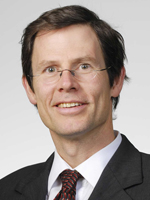Go to
February 18, 2016
Interposer-based Heterogeneous Processing for Efficient Exascale Systems
Thursday, 18 February 2016 at 14:30 in room INF 328
Wayne Burleson, AMD Research, Boston, MA and University of Massachusetts, Amherst, MA, USA
Abstract:
Exascale systems for high-performance computing and big data (ie supercomputers) will drive new technologies from software and architectures, to circuits and manufacturing technologies. The US Department of Energy has set a goal of 50 GFLOPS/Watt for an Exascale system in 2023. This requires significant innovations in energy efficiency, ranging from low-voltage techniques and novel memory systems, to accelerators such as GPUs and FPGAs. (DARPA has set a similar target of 20 pJ/op for systems ranging from embedded medical devices to supercomputers). This talk reviews recently published work from AMD Research on exascale technologies, and funded by the US DOE.
After an introduction to the various layers and challenges involved, a deep dive on interposer-based technologies will be presented. Interposers provide a new technology for assembling subsystems of heterogeneous processors and make us re-think how to partition systems to maximize energy efficiency, performance and reliability, while minimizing manufacturing, test and operating costs.
The concept of "dis-integration" of large die into smaller die connected via interposer flies in the face of the conventional wisdom to integrate as much as possible. Heterogeneity in terms of CMOS technology node as well as architectural function is shown to provide a compromise between cost, performance and efficiency while meeting exascale goals. These technologies are also being explored for future AMD products, from clients for game consoles, high-end graphics and virtual reality, to enterprise and cloud servers.
 Wayne Burleson is Senior Fellow at AMD Research since 2012, leading research in energy-efficient circuits and systems. He is also ECE Professor at University of Massachusetts, Amherst since 1990, where he teaches and conducts research in VLSI design, security engineering and the design and application of microelectronics for power-constrained applications.
Wayne Burleson is Senior Fellow at AMD Research since 2012, leading research in energy-efficient circuits and systems. He is also ECE Professor at University of Massachusetts, Amherst since 1990, where he teaches and conducts research in VLSI design, security engineering and the design and application of microelectronics for power-constrained applications.
He is an IEEE Fellow for contributions to signal processing and integrated circuit design.
Prof. Burleson has interacted with the semiconductor industry extensively throughout his career and has also had three sabbaticals in Europe including Telecom/Paris, LIRM Montpellier and most recently, EPFL in 2010-11.
Secondary navigation
- January 29, 2018
- August 30, 2017
- Past seminars
- 2016 - 2017 Seminars
- 2015 - 2016 Seminars
- 2014 - 2015 Seminars
- 2013 - 2014 Seminars
- 2012 - 2013 Seminars
- 2011 - 2012 Seminars
- 2010 - 2011 Seminars
- 2009 - 2010 Seminars
- 2008 - 2009 Seminars
- 2007 - 2008 Seminars
- 2006 - 2007 Seminars
- August 31, 2007
- June 29, 2007
- June 20, 2007
- June 5, 2007
- May 30, 2007
- May 16, 2007
- May 15, 2007
- April 24, 2007
- March 27, 2007
- March 14, 2007
- February 9, 2007
- February 8, 2007
- January 12, 2007
- December 5, 2006
- November 14, 2006
- October 31, 2006
- October 27, 2006
- October 26, 2006
- October 20, 2006
- September 20, 2006
- September 20, 2006
- September 20, 2006
- September 19, 2006
- 2005 - 2006 Seminars
- August 23, 2006
- August 22, 2006
- June 26, 2006
- June 20, 2006
- June 16, 2006
- June 7, 2006
- June 6, 2006
- May 30, 2006
- May 17, 2006
- May 10, 2006
- April 27, 2006
- April 12, 2006
- March 31, 2006
- March 29, 2006
- March 22, 2006
- March 15, 2006
- February 27, 2006
- February 8, 2006
- January 25, 2006
- January 19, 2006
- January 18, 2006
- January 17, 2006
- January 11, 2006
- November 30, 2005
- November 23, 2005
- November 2, 2005
- October 26, 2005
- October 25, 2005
- October 5, 2005
- September 28, 2005
- 2005 Seminars

